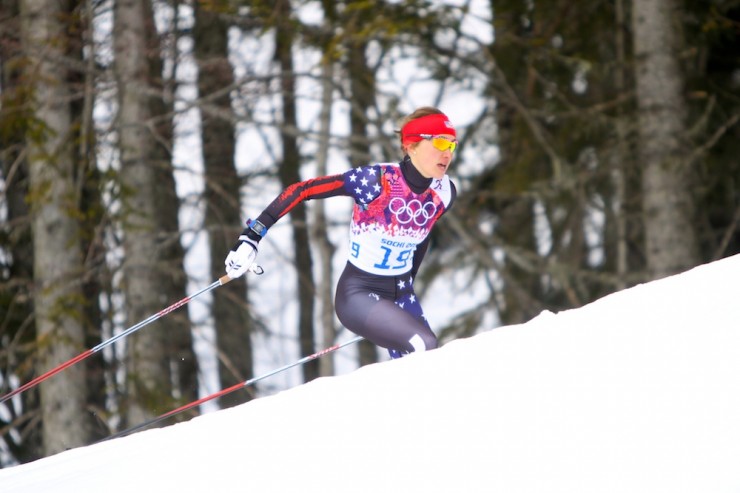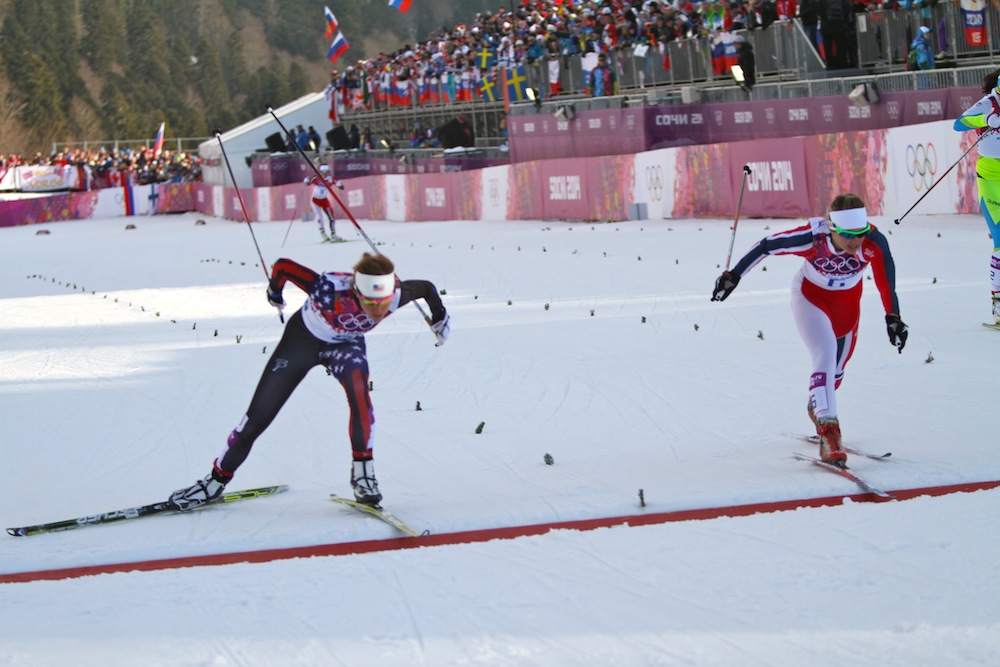
FasterSkier’s coverage is made possible through the generous support of Rudy Project.
SOCHI, Russia – At 5:30 p.m. Sochi time, Matt Whitcomb, the women’s coach of the U.S. Ski Team, was standing at the top of the Olympic sprint course. He watched Sophie Caldwell, a U.S. Ski Team rookie ranked 13th in the world in sprinting head into the woods in fourth place in the women’s sprint final. But the person who skied out in fourth place was not Caldwell.
“As soon as she didn’t come out we knew there was an altercation,” Whitcomb said. “It’s
pretty clear what happens. You never know if it was a crash or a broken pole… I was only 100 feet away from it, but I couldn’t quite tell.”
As it turned out, Caldwell got pinched in a tight corner and fell. She’s still not clear on exactly what happened, but it seemed to involve Astrid Jacobsen of Norway, who went on to finish fourth.
“We were coming around that corner on top, and someone tried to come super into the inside, and I was stepping over to take the corner and we got kind of tangled,” Caldwell said. “Before I knew it I was on my butt.”
Caldwell lost significant time, and the rest of the heat accelerated away from her on the next downhill. She was never able to regain contact. But sixth place was still a new best result for a U.S. woman at the Olympics – besting Jessie Diggins’ performance from the skiathlon and Kikkan Randall’s from the classic sprint in 2010, where each placed eighth.
“I’m kind of riding an excitement high,” Caldwell said.

Meanwhile, more than 5,000 miles away in Vermont, Caldwell’s father Sverre was supposed to be running a practice at the Stratton Mountain School (SMS), where he is the head coach. The problem was, his daughter had just kept advancing, advancing, advancing. He had already pushed the start of practice back several times, and finally just decided to be late.
“She’s improving faster than most of us would have guessed or even hoped for,” Sverre Caldwell said of his daughter. “She’s always had good speed. As a J1, she qualified sixth at World Juniors in the sprint. So she’s always had the speed and in the last two years she’s just been able to train more and stay healthier because she’s not balancing so many things.”
The final didn’t end up as Caldwell or any of her supporters might have hoped, but sixth place which was good enough for celebration.
“To make the final was really exciting,” Caldwell said. “I definitely wasn’t expecting that coming into today, so it exceeded any expectations that I had. I was just thrilled to be there.”
After qualifying in ninth, Caldwell obviously knew she was in good form. She skied aggressively at the front of her quarterfinal heat, leading most of the race until the final corner when Katja Visnar of Slovenia skated past. Caldwell responded by increasing her speed and pulling even, but Visnar had one more gear and made it across the line first.
Still, Caldwell was an automatic qualifier into the semifinals.
“In the quarter I decided to lead most of it,” Caldwell said of her tactics. “That ended up working out, but I got pretty tired. So in the semi I wanted to conserve some energy so I would have some left for the finish stretch.”
In the semifinal, Caldwell stayed in the middle of the pack until the final finishing straight, then put on a mad surge from fourth to the front and force a photo finish with Ingvild Flugstad Østberg of Norway, who had led most of the heat. When all was said and done, Caldwell was in second, but only 0.01 seconds behind Østberg. Once again, she had earned an automatic advancement, this time to the final.
“I was definitely glad I had saved a bit,” Caldwell said of her finishing sprint.
In the process, she had knocked out several medal contenders: for instance, Denise Herrmann of Germany, who had made the move that led to Kikkan Randall’s elimination in the quarterfinals, and Marit Bjørgen of Norway, gold medalist in the skiathlon. (Bjørgen crashed, but seemed unlikely to overtake the leaders anyway, although you can never say for sure with the winningest female skier of all time.)
“I try not to think too much about who is in my heat too much going into it, but I kind of – right before the semi, we pulled out the piece of paper just to see who I was with,” Caldwell said. “It was Marit, Ingvild, Denise, and that was a little intimidating. But I’ve raced them all before, and I tried to remind myself that it was just another ski race. I had to do it, and I belonged there. And off we went!”
When asked how she looked so relaxed on the starting line – in each heat, she flashed a big smile and waved to the crowd – Caldwell asked, “did I?”

But even if she was nervous, Caldwell was purposeful about how she approached the whole day.
“My dad said to remember that I ski the best when I’m having fun, so try to have fun with it,” she said.
When asked about it, the elder Caldwell said: “It’s one of those things where you just have to trust that you’re ready and go out and do your best, and see what happens. It’s not a time to be overcoaching them. Just have fun and enjoy the process and go for it. So I didn’t feel like I needed to talk to her beforehand. She knows what she’s doing.”
Whitcomb, too, had total confidence in Caldwell’s abilities.
“We knew she could be on the podium today, particularly after we saw her in the semifinals,” he said. “And then when she got to the top of the hill in fourth, that’s an ideal position to be in, and with the draft on this course. And then considering the soft snow, fast skis, tactical brilliance, we knew anything was possible. As well as crashing and
getting sixth?”
The journey towards turning in a best-ever performance for the U.S. has been a quick one for Caldwell, who graduated from Dartmouth College in 2012 and joined the newly formed SMS T2 team. In her first season, she qualified for World Championships and finished 20th in the classic sprint. This season has seen an even bigger jump in performance.
“Going into the year, her goal was to get a lot of experience and try to just improve, the usual things, to move up the list and hopefully to make the Olympics,” her father said. “It wasn’t a goal to win the Olympics.”
Caldwell’s result is a bigger success for the two-year-old team, which Sverre Caldwell, who had the idea to form it, could have hoped for. He didn’t predict that the team would succed so quickly.
“I knew we had a really good core group, and then when Jessie [Diggins] joined it was like, okay, this is awesome, and then when Simi [Hamilton] joined, it was like, that’s really cool,” he said. “That’s my goal is a coach, is to have a program which gets people ready to succeed on the World Championships and Olympic scene. When Jessie and Kikkan won the team sprint at World Championships, I said, okay, I’ve reached my goal! I wanted someone to win a medal, and it had happened.”
The longtime SMS coach said that Diggins was a big part of his daughter’s improvement, but credit also had to be given to her other training partners – Erika Flowers, Annie Hart, and Annie Pokorny – as well.
“She can go out training and say, I’m faster than Jessie over a short time,” he explained. “That has to give you confidence, to know that you’re right in there skiing with and beating a World Champion. So then you need to just keep getting fitter… Having that group, everyone has their relative different strengths and stuff like that. If you’re not feeling great one day, you can just hop in behind someone else and still have someone to learn from.”
But Caldwell’s sprint was not just a success for SMS – it was a testament to the U.S. Ski Team and the ski community as a whole. Before the final, Caldwell said, Randall approached her, gave her a hug, and said good luck.
“That helped a lot,” she laughed.
“I’m so proud of Sophie,” Whitcomb said. “Surprise is not the response. It’s just pure joy watching her ski… Sophie’s tactically phenomenal through this soft, difficult snow, so she was in a position to finish much higher than she did. But I’m very happy with sixth place today.”
Caldwell noted the success of her other teammates, and hoped that her appearance in the final might soothe some of the sting from Randall’s elimination.
“I mean, I think any day that all of us qualify for the heats is a good day,” she said. “Even though we can only start four, we have a really deep team and we have another three girls who probably could have been in the heats, had they had a start position. So even though there were some individual disappointments on the day, having six of us qualify between men and women is a really strong day.”
-Nat Herz contributed reporting

Chelsea Little
Chelsea Little is FasterSkier's Editor-At-Large. A former racer at Ford Sayre, Dartmouth College and the Craftsbury Green Racing Project, she is a PhD candidate in aquatic ecology in the @Altermatt_lab at Eawag, the Swiss Federal Institute of Aquatic Science and Technology in Zurich, Switzerland. You can follow her on twitter @ChelskiLittle.




3 comments
teamepokeedsbyn
February 11, 2014 at 5:50 pm
Great job Sophie….go SMS!
John Forrest Tomlinson
February 11, 2014 at 6:33 pm
Nice. Medal prospects for the US women look great for the relay.
Train Wreck
February 11, 2014 at 10:10 pm
Great coverage on an important race on an important day.